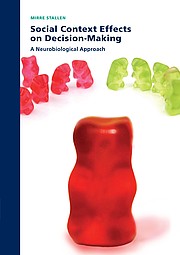Social Context Effects on Decision-Making: A neurobiological approach Defended on Friday, 24 May 2013
This thesis explores how social context influences the neurobiological processes underlying decision-making. To this end, this research takes an interdisciplinary approach, combining methods and insights from Psychology, Marketing, Economics, and Neuroscience. In particular, behavioral responses are collected, and used in combination with both functional magnetic resonance imaging (fMRI) techniques and pharmacological interventions examining the role of the hormone oxytocin in decision-making.
The first part of this thesis is concerned with the effects of social influence on decision-making, or in other words, how our decisions are influenced by the behavior and beliefs of other people. Specifically, this part examines the influence of both celebrity endorsements and peer groups on the neural processes underlying decision-making. The second part of this thesis investigates the influence of social norms on decision-making. This section examines the neural processes involved in cooperation and the role of oxytocin in social norm enforcement.
An important conclusion of the thesis is that a better understanding of the neurobiological mechanisms underlying social decision-making not only provides useful knowledge about the psychological and neural basis of our behavior, but that this knowledge can also inform policy decisions targeted at behavioral change.
Keywords
social context, neuroimaging, oxytocin, in-group, social influence, social norms, celebrity endorsement, cooperation, altruistic punishment, conformity










